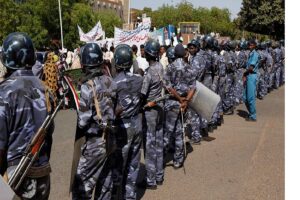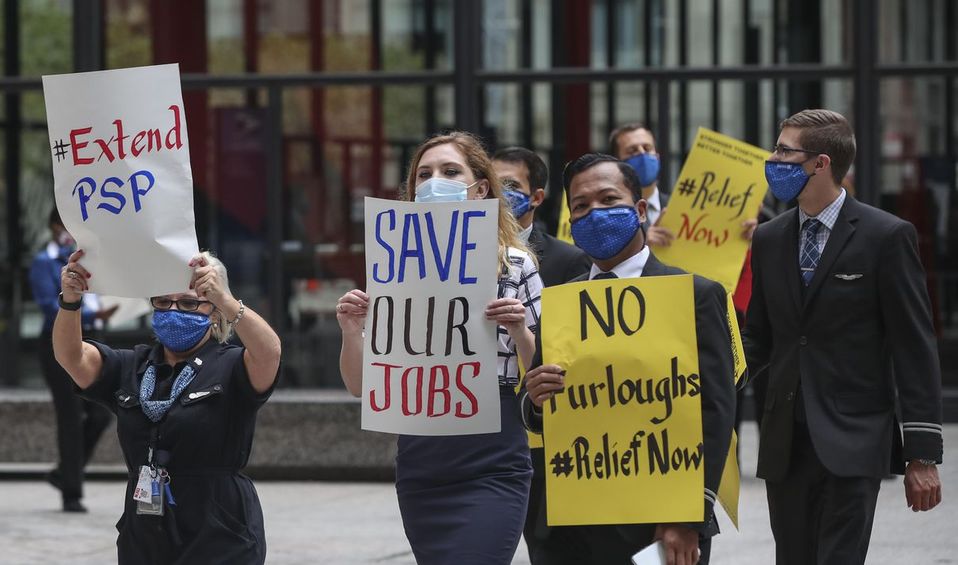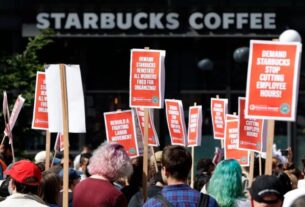Written by CWI supporters in Sudan.
 Yesterday January 8, 2018, protests broke out in various cities across Sudan, including the capital Khartoum and the southern cities of Nyala, Geneina and al-Damazin, as well as in West Darfour.
The immediate trigger was the doubling of the price of bread after the government’s removal of subsidies in its 2018 budget, adopted late last month. The Interior Ministry declared that protesters would be dealt “forcefully”. One student was killed in the ensuing state repression, while leaders of the opposition Sudan Congress Party were arrested and six newspapers critical of the subsidy cuts were banned from sale.
Last October, the majority of US-imposed economic sanctions on Sudan, which had been in place for two decades, were lifted. Despite expectations, the economic situation for the majority of the population worsened, with inflation reaching new records. Three quarters of the new state budget were allocated to military and security spending. And the government is facing pressure from the IMF to slash energy subsidies, which provide a lifeline for many poor and working class families.
The corrupt and brutal rule of Omar al-Bashir cannot hide behind the sanctions of US imperialism anymore to blame the bad economic situation experienced by the Sudanese people. The ruling elite’s plundering of wealth, mass corruption and wastage of resources in bloody wars stand exposed, for all to see. Protests like those that took place yesterday are a harbinger of things to come, as anger against the regime is escalating from many quarters.
Below we publish an article written before Sunday’s protests by a supporter of the CWI living in Khartoum, providing some background to the recent developments.
At the end of 2017, and after a long wait, the Sudanese government came out with a budget proposal for the year 2018 to be discussed in the Parliament. After four years of reducing fuel subsidies, a policy defended by the government as a “remedy for the deteriorating economy”, the economy has only gotten worse and the deficit has risen to 28 billion Sudanese pounds – a dramatic increase from the previous year. The new budget clarified the continuation of the government’s war policy, with the share of security and defence spending totalling over 20 billion, while the total share of education and health is no greater than 8 billion. These are sectors in which Sudanese people are particularly suffering, with high illiteracy rates, a health sector extremely degraded and the prices of medicines increasing to levels ordinary people simply cannot afford.
And it does not stop there. The government will continue the policy of gradually lifting government subsidies on hydrocarbons, which caused massive protests in 2012 and 2013. Back then, the government used live ammunition to smash the protests and caused the deaths of scores of protesters. A few days before the budget, the government also announced the lifting of subsidies on the customs dollar, devaluing the Sudanese pound from 7 per dollar to 18 per dollar. This will dreadfully affect the rise of prices of goods, and at a time when people are already complaining about continuing inflation (which is currently around 25%), as a result of the devaluation of the Sudanese pound compared to other currencies. This policy will choke the poor even further, as they will no longer be able to buy for even their basic needs.
While the government is raising its paramilitary budget, it is harassing a number of activists and politicians through its security agencies. Last week political dissidents, Ilham Malik and Ehssan Ebdalaziz, were apprehended. The National Intelligence and Security Service interrogated them since daily, without explaining why, making them wait between these sessions, for many hours, without any reasons given, as a method of psychological control. The president of the Island Farmers’ Union, Hassbo Ebrahim, was also arrested in the morning of December 28th.
The system not only harasses and denies freedom to political activists, and attacks the personal rights of people; it also extorts money from citizens through the law of “Public Order”, which even determines the form of people’s clothing. Twenty-four girls were arrested over the past month and presented to the courts on the charge that their dress was “indecent”. The charges were subsequently dropped after the case provoked international outcry. But many cases go unreported by the media. Recent statistics show that more than 40,000 public order cases are annually recorded in Khartoum state alone! The Public Order law being invoked is loose and its interpretation only depends on the arbitrary measure of the police officers in charge. Beyond being a tool of submission, especially against women, this law is applied much more towards the end of each year as it is used to get as much money as possible to close the budget.
Shifts in foreign policy
At the same time as the government was announcing the budget, it received a visit from Turkish President Erdogan, during which many meetings were held and agreements signed between the two countries on economic and military matters. Most notably, an agreement was reached handing over the port city of Suakin, an island on the west coast of the Red Sea (which has archaeological monuments from the Ottoman era) to the management of the Turkish government, for a period of 99 years. Activists protested against this decision, arguing that it infringes on local people’s land rights and that the territory of Sudan belongs to its citizens and should not to be bargained by governments.
The visit was accompanied by a tripartite meeting between the leadership of the Turkish, Sudanese and Qatari military forces. There is speculation that Suakin could become a Turkish military outpost in Sudan, after talks during the visit of al-Bashir to Russia, last month, on establishing a Russian military base on the Red Sea shore failed.
The visit to Russia, along with Turkey’s growing military, economic and political influence in Sudan, illustrate the rapid changes in foreign relations and the balancing act of the Sudanese regime towards the Turkish-Qatari alliance in the region, while the strong relations between Sudan and Saudi Arabia are going through a storm. The Saudi regime’s brutal stance against the Houthis in the Yemeni war created unease in Khartoum. Relations have begun to deteriorate recently following a clash between the Emirati and Sudanese military forces in the south of Yemen.
The recent visit to Russia and by Turkey’s president to Sudan will heighten the tense political atmosphere between Sudan and the regional pole around Saudi Arabia and Egypt. The Egyptian media have strongly criticized this recent rapprochement, fearing that the presence of a military base in Sudan would constitute a threat to neighbouring countries. Egyptian-Sudanese relations were recently strained due to the revival of the disputed territories of Hala’ib and Shalateen, as well as the argument over Sudan’s support of Ethiopia in its building of a huge hydroelectric dam (the Nahdha Dam, or “Renaissance Dam”) on the Blue Nile River.
All of these developments come at a time when the parties are preparing for the next general elections in April 2020. Also, parliament is debating a decision to amend the constitution to allow al-Bashir to run for office for a third time (the current constitution does not allow him to run more than twice). The last elections were in 2015, and were boycotted by the major opposition parties. However this time some of the parties are expected to participate in elections, as they have since entered the “national dialogue” called by the regime.
The CWI in Sudan believes that this ‘dialogue’ with the regime is an attempt to lure the opposition into a deal that preserves the essence of the regime’s pro-capitalist policies. It is rejected by the vast majority of the Sudanese people. We advocate instead the building of an independent struggle of working people and the poor to overthrow al-Bashir’s rotten regime. It needs to be replaced with a government based upon democratically elected representatives from all Sudan’s different regions and communities, that would initiate a socialist reconstruction of the country, based on the planning of wealth in the interests of Sudan’s entire population.
Yesterday January 8, 2018, protests broke out in various cities across Sudan, including the capital Khartoum and the southern cities of Nyala, Geneina and al-Damazin, as well as in West Darfour.
The immediate trigger was the doubling of the price of bread after the government’s removal of subsidies in its 2018 budget, adopted late last month. The Interior Ministry declared that protesters would be dealt “forcefully”. One student was killed in the ensuing state repression, while leaders of the opposition Sudan Congress Party were arrested and six newspapers critical of the subsidy cuts were banned from sale.
Last October, the majority of US-imposed economic sanctions on Sudan, which had been in place for two decades, were lifted. Despite expectations, the economic situation for the majority of the population worsened, with inflation reaching new records. Three quarters of the new state budget were allocated to military and security spending. And the government is facing pressure from the IMF to slash energy subsidies, which provide a lifeline for many poor and working class families.
The corrupt and brutal rule of Omar al-Bashir cannot hide behind the sanctions of US imperialism anymore to blame the bad economic situation experienced by the Sudanese people. The ruling elite’s plundering of wealth, mass corruption and wastage of resources in bloody wars stand exposed, for all to see. Protests like those that took place yesterday are a harbinger of things to come, as anger against the regime is escalating from many quarters.
Below we publish an article written before Sunday’s protests by a supporter of the CWI living in Khartoum, providing some background to the recent developments.
At the end of 2017, and after a long wait, the Sudanese government came out with a budget proposal for the year 2018 to be discussed in the Parliament. After four years of reducing fuel subsidies, a policy defended by the government as a “remedy for the deteriorating economy”, the economy has only gotten worse and the deficit has risen to 28 billion Sudanese pounds – a dramatic increase from the previous year. The new budget clarified the continuation of the government’s war policy, with the share of security and defence spending totalling over 20 billion, while the total share of education and health is no greater than 8 billion. These are sectors in which Sudanese people are particularly suffering, with high illiteracy rates, a health sector extremely degraded and the prices of medicines increasing to levels ordinary people simply cannot afford.
And it does not stop there. The government will continue the policy of gradually lifting government subsidies on hydrocarbons, which caused massive protests in 2012 and 2013. Back then, the government used live ammunition to smash the protests and caused the deaths of scores of protesters. A few days before the budget, the government also announced the lifting of subsidies on the customs dollar, devaluing the Sudanese pound from 7 per dollar to 18 per dollar. This will dreadfully affect the rise of prices of goods, and at a time when people are already complaining about continuing inflation (which is currently around 25%), as a result of the devaluation of the Sudanese pound compared to other currencies. This policy will choke the poor even further, as they will no longer be able to buy for even their basic needs.
While the government is raising its paramilitary budget, it is harassing a number of activists and politicians through its security agencies. Last week political dissidents, Ilham Malik and Ehssan Ebdalaziz, were apprehended. The National Intelligence and Security Service interrogated them since daily, without explaining why, making them wait between these sessions, for many hours, without any reasons given, as a method of psychological control. The president of the Island Farmers’ Union, Hassbo Ebrahim, was also arrested in the morning of December 28th.
The system not only harasses and denies freedom to political activists, and attacks the personal rights of people; it also extorts money from citizens through the law of “Public Order”, which even determines the form of people’s clothing. Twenty-four girls were arrested over the past month and presented to the courts on the charge that their dress was “indecent”. The charges were subsequently dropped after the case provoked international outcry. But many cases go unreported by the media. Recent statistics show that more than 40,000 public order cases are annually recorded in Khartoum state alone! The Public Order law being invoked is loose and its interpretation only depends on the arbitrary measure of the police officers in charge. Beyond being a tool of submission, especially against women, this law is applied much more towards the end of each year as it is used to get as much money as possible to close the budget.
Shifts in foreign policy
At the same time as the government was announcing the budget, it received a visit from Turkish President Erdogan, during which many meetings were held and agreements signed between the two countries on economic and military matters. Most notably, an agreement was reached handing over the port city of Suakin, an island on the west coast of the Red Sea (which has archaeological monuments from the Ottoman era) to the management of the Turkish government, for a period of 99 years. Activists protested against this decision, arguing that it infringes on local people’s land rights and that the territory of Sudan belongs to its citizens and should not to be bargained by governments.
The visit was accompanied by a tripartite meeting between the leadership of the Turkish, Sudanese and Qatari military forces. There is speculation that Suakin could become a Turkish military outpost in Sudan, after talks during the visit of al-Bashir to Russia, last month, on establishing a Russian military base on the Red Sea shore failed.
The visit to Russia, along with Turkey’s growing military, economic and political influence in Sudan, illustrate the rapid changes in foreign relations and the balancing act of the Sudanese regime towards the Turkish-Qatari alliance in the region, while the strong relations between Sudan and Saudi Arabia are going through a storm. The Saudi regime’s brutal stance against the Houthis in the Yemeni war created unease in Khartoum. Relations have begun to deteriorate recently following a clash between the Emirati and Sudanese military forces in the south of Yemen.
The recent visit to Russia and by Turkey’s president to Sudan will heighten the tense political atmosphere between Sudan and the regional pole around Saudi Arabia and Egypt. The Egyptian media have strongly criticized this recent rapprochement, fearing that the presence of a military base in Sudan would constitute a threat to neighbouring countries. Egyptian-Sudanese relations were recently strained due to the revival of the disputed territories of Hala’ib and Shalateen, as well as the argument over Sudan’s support of Ethiopia in its building of a huge hydroelectric dam (the Nahdha Dam, or “Renaissance Dam”) on the Blue Nile River.
All of these developments come at a time when the parties are preparing for the next general elections in April 2020. Also, parliament is debating a decision to amend the constitution to allow al-Bashir to run for office for a third time (the current constitution does not allow him to run more than twice). The last elections were in 2015, and were boycotted by the major opposition parties. However this time some of the parties are expected to participate in elections, as they have since entered the “national dialogue” called by the regime.
The CWI in Sudan believes that this ‘dialogue’ with the regime is an attempt to lure the opposition into a deal that preserves the essence of the regime’s pro-capitalist policies. It is rejected by the vast majority of the Sudanese people. We advocate instead the building of an independent struggle of working people and the poor to overthrow al-Bashir’s rotten regime. It needs to be replaced with a government based upon democratically elected representatives from all Sudan’s different regions and communities, that would initiate a socialist reconstruction of the country, based on the planning of wealth in the interests of Sudan’s entire population.



